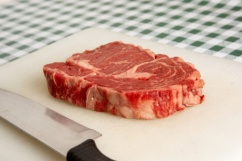 ard University, published in the British Medical Journal, analysed the diets of 89,000 women between the ages of 24-43 and noted: “Higher red meat intake in early adulthood may be a risk factor for breast cancer.”
ard University, published in the British Medical Journal, analysed the diets of 89,000 women between the ages of 24-43 and noted: “Higher red meat intake in early adulthood may be a risk factor for breast cancer.”However, independent dietitian Dr Carrie Ruxton and advisor to the Meat Advisory Panel (MAP) called the study into question: “This was a population-based study among pre-menopausal women in the US Nurses’ Health Study, which has been the subject of many different analyses over the years.
“In the current paper, the association between meat and breast cancer was evaluated from data from women who completed a questionnaire on diet over 20 years ago – in 1991. The actual intake of meat in this study was not measured by the researchers; instead it was estimated according to a food frequency questionnaire (FFQ).
“FFQs are not the most accurate measure of food intake and are subject to significant error. Although the researchers tried to account for this, uncertainty remains about the quantities of foods consumed.”
The Department of Health has advised that people who eat more than 90g of red and processed meat to cut down to 70g, which is widely considered as safe. Moreover, MAP highlighted that the average UK intake is 72g of red meat, showing that, for most people, red meat consumption does not need to change.
Ruxton also highlighted that US consumption of meat is generally higher than UK consumption, which should be considered with the results of the study.
“The relationship between meat and breast cancer has been looked at in other studies. The overall evidence from prospective cohort studies suggests no significant association between red meat intake and breast cancer. A pooled analysis of eight cohort studies found a null association between intake of red meat and risk of breast cancer,” Ruxton concluded.





